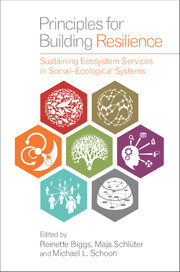Book contents
- Frontmatter
- Dedication
- Contents
- Acknowledgements
- Foreword
- List of contributors
- 1 An introduction to the resilience approach and principles to sustain ecosystem services in social–ecological systems
- 2 Politics and the resilience of ecosystem services
- 3 Principle 1 –Maintain diversity and redundancy
- 4 Principle 2 – Manage connectivity
- 5 Principle 3 –Manage slow variables and feedbacks
- 6 Principle 4 – Foster complex adaptive systems thinking
- 7 Principle 5 – Encourage learning
- 8 Principle 6 – Broaden participation
- 9 Principle 7 – Promote polycentric governance systems
- 10 Reflections on building resilience – interactions among principles and implications for governance
- Index
2 - Politics and the resilience of ecosystem services
Published online by Cambridge University Press: 05 May 2015
- Frontmatter
- Dedication
- Contents
- Acknowledgements
- Foreword
- List of contributors
- 1 An introduction to the resilience approach and principles to sustain ecosystem services in social–ecological systems
- 2 Politics and the resilience of ecosystem services
- 3 Principle 1 –Maintain diversity and redundancy
- 4 Principle 2 – Manage connectivity
- 5 Principle 3 –Manage slow variables and feedbacks
- 6 Principle 4 – Foster complex adaptive systems thinking
- 7 Principle 5 – Encourage learning
- 8 Principle 6 – Broaden participation
- 9 Principle 7 – Promote polycentric governance systems
- 10 Reflections on building resilience – interactions among principles and implications for governance
- Index
Summary
SUMMARY
Different sectors of society typically value, need and demand different bundles of ecosystem services. At the same time, important trade-offs exist between the production of different services, and it is not possible to increase the resilience of all ecosystem services simultaneously. Decisions about which services to sustain in a particular social–ecological system therefore require trade-offs that are inherently political. Politics can be described as ‘the authoritative allocation of values for a society’ (Easton 1965). To further complicate matters, the desired mix of services will evolve with changing societal values and preferences, and the resilience of ecosystem services is only one among many desired outcomes (e.g. equality, human rights, democracy) of social–ecological systems. Resolving these trade-offs requires resolution of collective-action dilemmas and intergroup conflicts, a process that comes replete with power inequalities, asymmetric resource bases and unequal outcomes. This chapter discusses some of the asymmetries and power dynamics that underlie decisions of which ecosystem services should form the focus for resilience-building initiatives; the remainder of the book assumes these choices have been made and focuses on how the resilience of some agreed-on mix of ecosystem services may be enhanced. Here, we focus specifically on the social consequences of trade-offs between ecosystem services; asymmetries in the distribution of ecosystem services; and we briefly discuss the broad literature of how these may be addressed through wider deliberative processes. We find that issues associated with the allocation of ecosystem services are poorly integrated into the resilience literature, and suggest that an improved understanding of allocation trade-offs could result from more applied research on use of ecosystem services that integrates perspectives from the social sciences about how and why people make and respond to decisions concerning ecosystem services.
INTRODUCTION
Prompted by escalating rates of environmental change, resilience thinking is one emerging applied field that explicitly seeks to inform managers and policy-makers in the governance of social–ecological systems (SES) and the ecosystem services they produce (Berkes et al. 2000; Walker and Salt 2006).
- Type
- Chapter
- Information
- Principles for Building ResilienceSustaining Ecosystem Services in Social-Ecological Systems, pp. 32 - 49Publisher: Cambridge University PressPrint publication year: 2015
- 9
- Cited by



